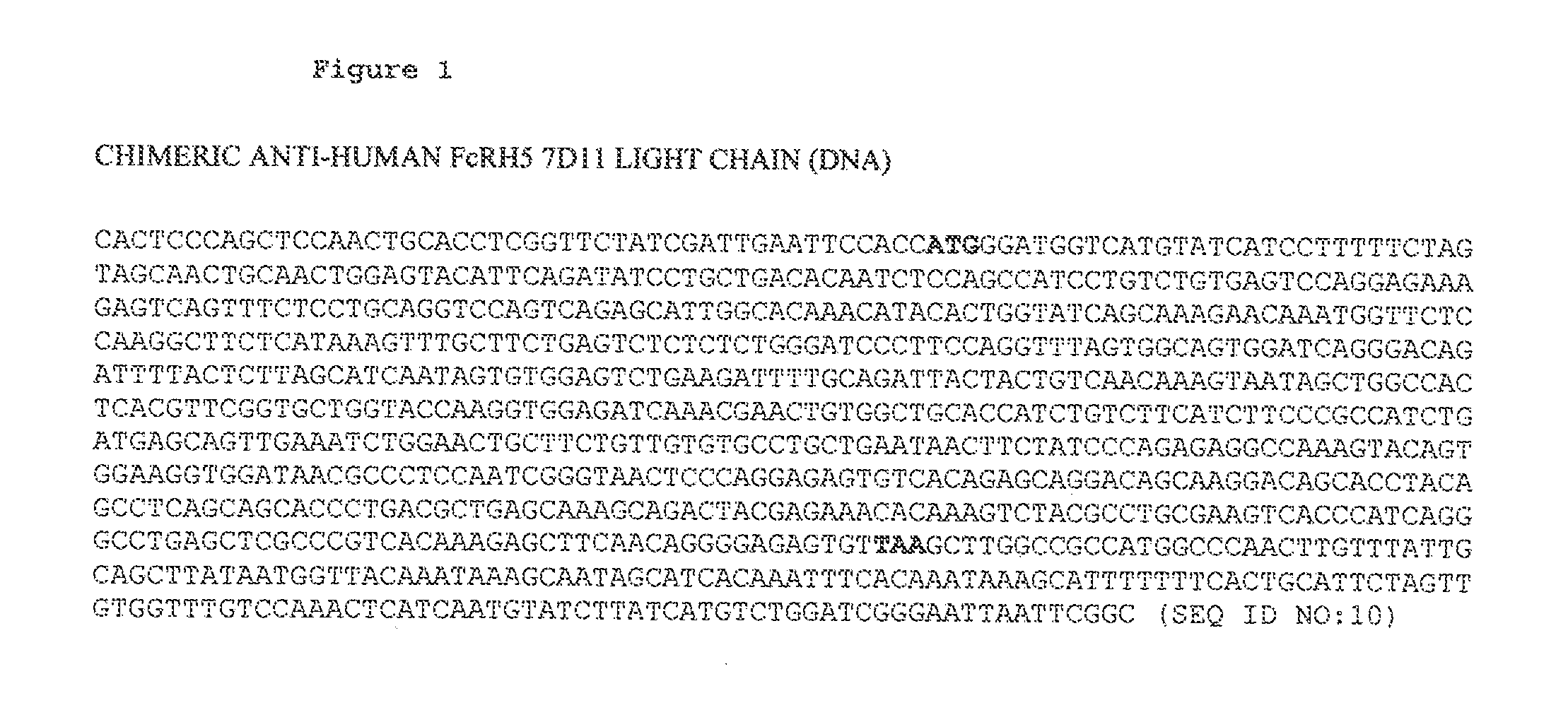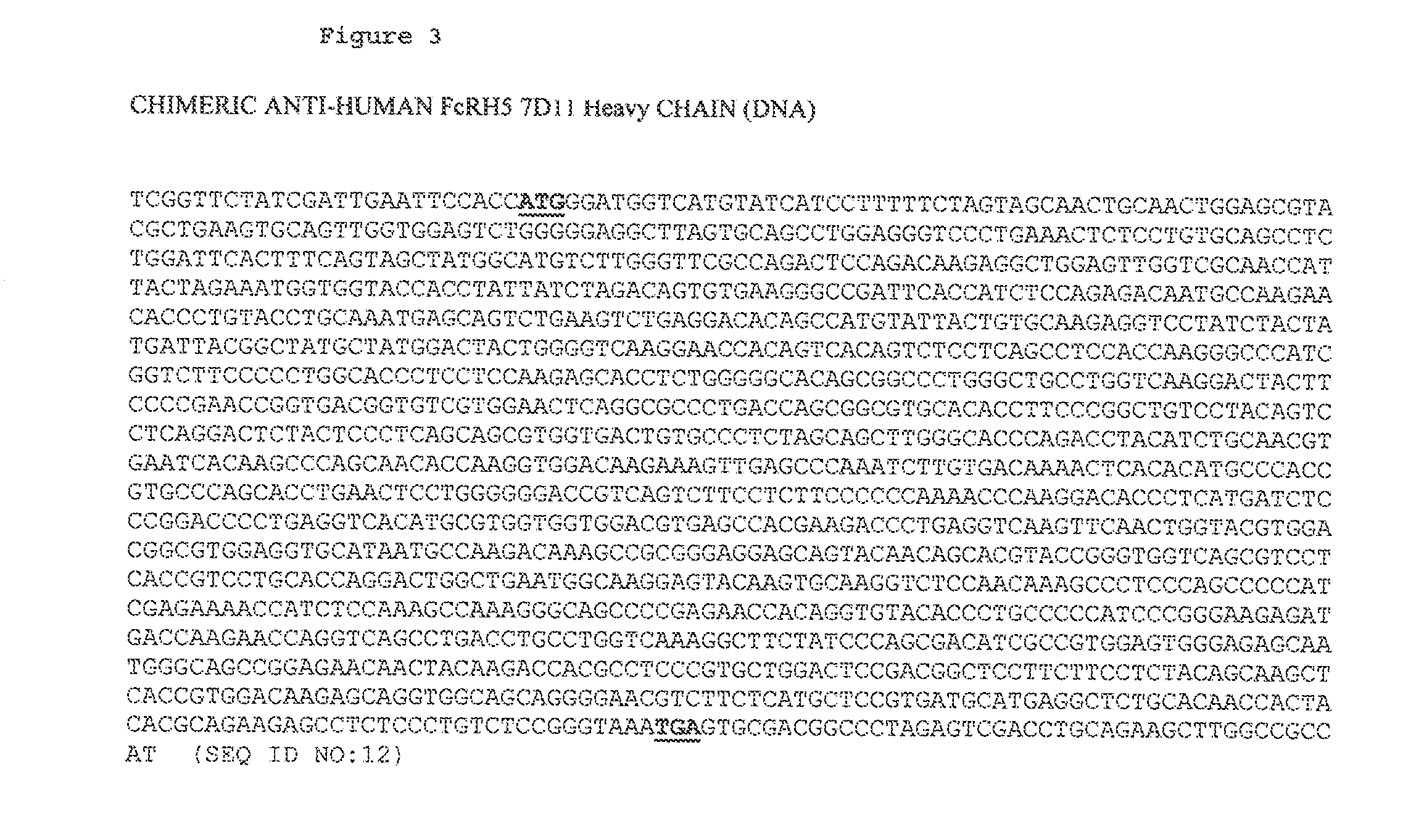ANTI-FcRH5 ANTIBODIES AND IMMUNOCONJUGATES AND METHODS OF USE
a technology of antibody and antibody conjugate, which is applied in the field of anti-fcrh5 antibodies and immunoconjugates and methods of use, can solve the problems of non-reproducible multi-step conjugation process, insufficient analytical and preparative methods to separate antibody-drug conjugate species, and potential problems in cysteine thiol group engineering by the mutation of various amino acid residues of a protein to cysteine amino acids, etc., to inhibit the growth of said cell, to effective treatmen
- Summary
- Abstract
- Description
- Claims
- Application Information
AI Technical Summary
Benefits of technology
Problems solved by technology
Method used
Image
Examples
example 1
Preparation of Antibodies that Bind FcRH5
[1039]This example illustrates preparation of monoclonal antibodies which can specifically bind FcRH5.
[1040]Techniques for producing the monoclonal antibodies are known in the art and are described, for instance, in Goding, supra. Immunogens that may be employed include purified FcRH5, fusion proteins containing FcRH5, and cells expressing recombinant FcRH5 on the cell surface. Selection of the immunogen can be made by the skilled artisan without undue experimentation.
[1041]Mice, such as Balb / c, are immunized with the FcRH5 immunogen emulsified in complete Freund's adjuvant and injected subcutaneously or intraperitoneally in an amount from 1-100 micrograms. Alternatively, the immunogen is emulsified in MPL-TDM adjuvant (Ribi Immunochemical Research, Hamilton, Mont.) and injected into the animal's hind foot pads. The immunized mice are then boosted 10 to 12 days later with additional immunogen emulsified in the selected adjuvant. Thereafter, f...
example 2
Generation of Anti-FcRH5 Antibody Drug Conjugates (ADCs)
[1096]The drugs used for generation of antibody drug conjugates (ADCs) for anti-human FcRH5 included maytansinoid DM1 and DM4 and dolastatin10 derivative monomethylauristatin E (MMAE). (See US20050276812, filed May 31, 2005 and US20050238649, filed Nov. 5, 2004, both of which are incorporated by reference in their entirety). DM1, DM4, and MMAE are mitotic inhibitors that are at least 100 fold more cytotoxic than the vinca alkaloid mitotic inhibitors used in chemotherapeutic treatments of NHLs (Doronina et al., Bioconjug. Chem., 17:114-123 (2006); Doronina et al., Nat. Biotechnol., 21: 778-784 (2003); Erickson et al., Cancer Res., 66: 4426-4433 (2006)). The linkers used for generation of the ADCs were SMCC for DM1, SPDB for DM4 and MC for MMAF or MC-vc-PAB for MMAE. For DM1 and DM4, the antibodies were linked to DM1 DM4 through the 8-amino group of lysine using the stable thioester linker SMCC (designated MCC after conjugation)....
example 3
Preparation of Cysteine Engineered Anti-FcRH5 Antibodies
[1100]Preparation of cysteine engineered anti-FcRH5 antibodies was performed as disclosed herein. Cysteine residues may be added to the light chain, the heavy chain or the Fc region of an antibody to enable conjugation to various drugs. In the preparation of the cysteine engineered anti-FcRH5 antibody 10A8, DNA encoding the light chain was mutagenized to substitute cysteine for valine at Kabat position 205 as shown in FIG. 13. DNA encoding the heavy chain was mutagenized to substitute cysteine for alanine at EU position 118 in the heavy chain (sequential position 118, Kabat number 114) as shown in FIG. 12. The Fc region of anti-FcRH5 antibodies may be mutagenized to substitute cysteine for serine at EU position 400 in the heavy chain Fc region (sequential position 400; Kabat number 396).
PUM
| Property | Measurement | Unit |
|---|---|---|
| pH | aaaaa | aaaaa |
| dissociation constant | aaaaa | aaaaa |
| dissociation constant | aaaaa | aaaaa |
Abstract
Description
Claims
Application Information
 Login to View More
Login to View More - R&D
- Intellectual Property
- Life Sciences
- Materials
- Tech Scout
- Unparalleled Data Quality
- Higher Quality Content
- 60% Fewer Hallucinations
Browse by: Latest US Patents, China's latest patents, Technical Efficacy Thesaurus, Application Domain, Technology Topic, Popular Technical Reports.
© 2025 PatSnap. All rights reserved.Legal|Privacy policy|Modern Slavery Act Transparency Statement|Sitemap|About US| Contact US: help@patsnap.com



